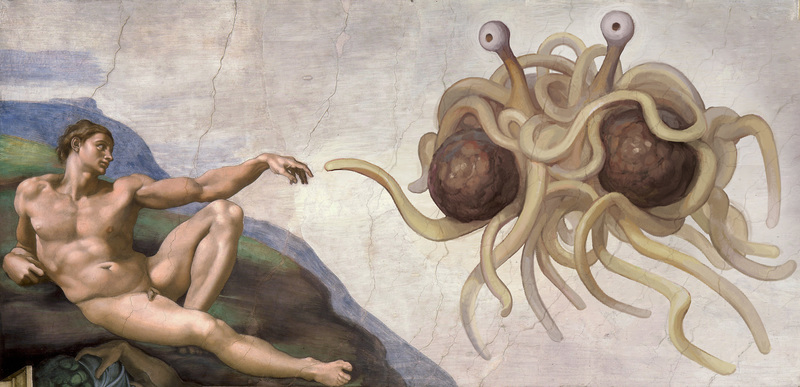 You may have heard that a resident of one of the fine establishments for convicted criminals in Nebraska has had his religious freedom abridged by a U.S. District judge who ruled that Pastafarianism (also known as, and referred to in court documents, as FSMism) does not qualify for Constitutional protection.
You may have heard that a resident of one of the fine establishments for convicted criminals in Nebraska has had his religious freedom abridged by a U.S. District judge who ruled that Pastafarianism (also known as, and referred to in court documents, as FSMism) does not qualify for Constitutional protection.
In making his ruling, John Gerrard provided an excellent summary of Pastafarianism for the unfamiliar:
FSMism is a riposte to intelligent design that began with a letter to the Kansas State Board of Education when it was considering intelligent design. See, Bobby Henderson, The Gospel of the Flying Spaghetti Monster 111-13 (2006) (FSM Gospel). The primary criticism of intelligent design—and the basis for excluding it from school science classes—is that although it purports to be “scientific,” it is actually “an interesting theological argument” but “not science.”
The article in Atlas Obscura continues:
The conceit of FSMism is that, because intelligent design does not identify the designer, its “master intellect” could just as easily be a “Flying Spaghetti Monster” as any Judeo-Christian deity—and, in fact, that there is as much scientific evidence for a Flying Spaghetti Monster as any other creator. See FSM Gospel at 3-4. 1 As the FSM Gospel explains, “[w]e are entering into an exciting time, when no longer will science be limited to natural explanations. . . . Propelled by popular opinion and local government, science is quickly becoming receptive to all logical theories, natural and supernatural alike.”
Based on this history, prison officials—and later, the court—not unreasonably determined that Pastafarianism is more satire than religion, and denied Cavanaugh such religious practices as wearing a pirate costume instead of his prison jumpsuit. But this particular cut-and-dry case belies Pastafarianism’s status worldwide.
I wonder if Christianity didn’t start out as a satire much like The Church of the Flying Spaghetti Monster? Imagine a group of ne’er-do-wells giggling in the ivied halls of the Aleppo College of Mud and Dung about how it was much funnier to add the Holy Ghost to Father and Son lest it sounded too much like a cross-country moving van company.
Perhaps this will help:

“not unreasonably determined that Pastafarianism is more satire than religion” is a nonsense argument. Satire is a part of Pastafarianism, and the two are inseparable.
LikeLike
I believe the quotation suggested that Pastafarianism is more satire than religion; how is that a nonsense argument? The judge was ruling whether Pastafarianism was a true religion and therefore protected by the Constitution or just an elaborate jest.
Also, the implication in your response is that satire is a subset of Pastafarianism and that being “inseparable” it should be possible to substitute one for the other. Pastafarianism is an example of satire; Pastafarianism can be referred to as a satire but satire cannot be referred to as Pastafarian. They are not inseparable. I can call Gulliver’s Travels a satire without any reference to Pastafarianism.
The origin of Pastafarianism was to suggest that an undefined supreme being might just as well be a Flying Spaghetti Monster as a white haired old white man in a white me’īl eating grapes. Is it then a formal satire?
I see it as the difference between Jonathan Swift’s pure satire in A Modest Proposal and his more informal satire where he posits a vision of unexplored lands in a more indirect manner: perhaps there are islands where highly intelligent Houyhnhnm’s live, but hidden in the speculation is an effective satire of mankind itself.
LikeLike
In “inseparable” I implied that satire is an inherent, integral component of Pastafarianism. Not necessarily otherwise. Satire can be unrelated to Pastafarianism. Pastafarianism can be unrelated to satire, but very often, if not always, is.
The fact that Pastafarianism is satire, does not make it “not a religion”. There is no mutual exclusion between religion and satire, in fact, in the case of Pastafarianism, the two are intertwined and are mutually reinforcing.
The whole point of Pastafarianism is that religion is a matter of perception and personal belief. You may think that you read Gulliver’s travels without any reference to Pastafarianism. But who do you think inspired Swift to write it? Right, the Flying Spaghetti Monster! See what I mean?
LikeLike